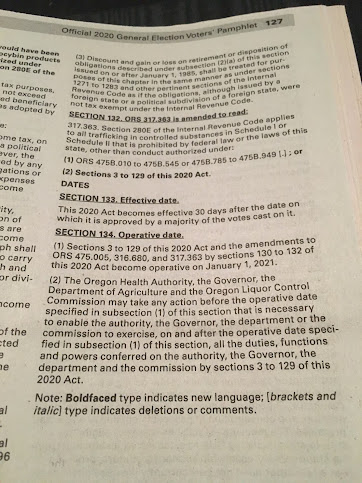Read the fine print? There wasn't any.
Anyway, the other day the county revealed that they over-estimated how much money the tax is going to raise by 21 percent. That's a lot. And 19 of that 21 percent comes because they supposedly didn't realize how much it would cost to give offsetting credits to people who already pay the hideous county business tax.
The existing business tax is imposed on business owners, including sole proprietors, partners in partnerships, and shareholders in S corporations. But some of those folks are also making enough that they have to deal with the new tax as well. The folks running the county have decided to give them a break and not tax them twice (although I don't think there's any law saying they couldn't). So when the owners figure their new income tax, they can subtract out the business tax they're also sending in. In some cases, the new income tax will be zero, because of the credit.
That credit is something that should have been highlighted when the tax was being voted on. Because it makes a big difference in understanding the nature of the tax. As it turns out, high-income employees – senior associates in law firms or well-paid employee doctors in private clinics, for example – will be paying the full county income tax, because employees aren't subject to the business tax. In contrast, the partners in those firms will be paying a lot less new tax, dollar for dollar of income, because they'll get credit for the business tax they already pay, and still have to pay.
And so what we are winding up with is more of a tax on high-income wage earners and high-income investors than it is a tax on high-income business owners. The credit aspect of the new code favors owners and does nothing to help employees. That should have been part of the discussion back in the summer and fall. But of course, it wasn't. They said something vaguely about avoiding double taxation, but it obviously wasn't thought through, much less disclosed. Hence the 19 percent shortfall that's just now coming to light.
But the real scandal, to my eye at least, is that they're just getting around to drafting the tax code now, even though the law was passed nearly three months ago. Why didn't everybody get the see the full law before it was put up for a vote?
Compare what happened with the two drug legalization measures we voted on. The full texts of both those laws were printed in the voter's pamphlet. The one on magic mushrooms by prescription ran 23 pages. The one on legalization of other street drugs was eight pages long.
That's what should have happened with the county income tax. Instead, they showed the voters something vague, which got dumbed down even further to "Tax the rich, it's for the children!" And of course, the voters of Portland can never resist that spiel. Now the lawyers start drafting, and funny thing, there are some devils in the details.
The stunts the politicians pull with their referenda may be legal – I've never fully understood the ballot measure rules in this nutty state – but they're not right. (Don't get me started on the Sam Adams memorial city arts tax, a true bait-and-switch operation. Maybe some other time.)
An additional sad note is that even with 21 percent less money than they projected, the bureaucrats say they'll still be able to do everything the ballot measure promotion promised. Which sure seems like another way of saying they padded it with about 25 percent more than they really needed.
Anyway, keep inventing new taxes, Portland. Drive all the successful people out to the suburbs, like 60 years ago. See what your city looks like then. The current mess may seem decent by comparison.

Thank you, Jack, for doing the research and writing about this. It means a lot to me, and I'm sure to many others, that someone with your expertise takes the time to investigate issues with local taxes that the powers-that-be would rather sweep under the rug. Unfortunately, I doubt if what you've revealed here had been known before the election, it would have made any difference. Soak-the-rich taxes are very popular at the moment. And what's not to love about full-time child care that someone else will pay for? Most voters never consider the details or the possible unintended consequences. Thinking back, did those who voted for the Arts Tax ever consider that City Hall would (apparently legally) alter the tax in substantial ways? Or that, to date, 14,600+ accounts would go to collections, ruining untold numbers of credit ratings? And so it is with this tax. Whether it's high-income folks leaving and taking their tax dollars with them, or the state complaining about lost revenue (between this and the Metro homeless tax, it's bound to add up at a 9.9% deduction rate), or parents having a stroke because they won't be able to take little Johnny or Janie to the preschool around the corner but have to drive across town for an available slot, it's going to be something. We just have to have a little patience.
ReplyDelete